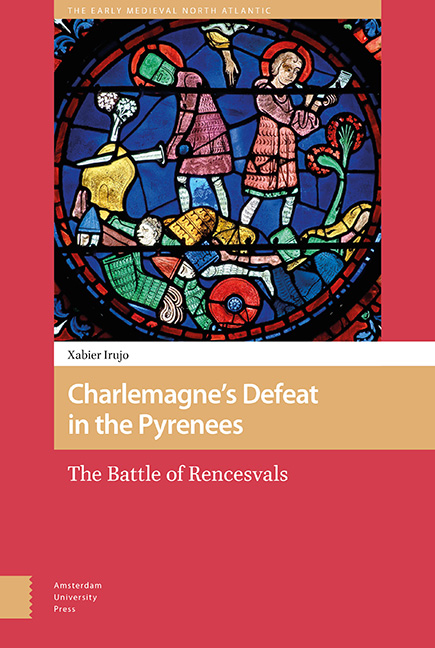3 - The Battle of Errozabal in Light of the Frankish Sources
Published online by Cambridge University Press: 18 June 2021
Summary
Abstract
This chapter describes the military operation, marches, fights and outcome of King Charles’ venture in August 778 with a detailed description of the route and the location of the Carolingian army's defeat. It therefore provides a comprehensive description of the action in the light of Medieval historical sources including a wide-ranging description of the characteristics of both armies, numbers and relative position in the battlefield, weaponry and clothing, and the strategic factors leading to the collapse of the Carolingian army and the resultant massacre in the Pyrenees. Based on original historical sources and a careful study of the terrain with the help of the Rangers of the Government of Navarre and expert archaeologists of the region, this is one of the most accurate and detailed description of the battle ever written.
Keywords: 778, Rencesvals, Errozabal, Charlemagne, Roland, Eneko
The Frankish historical sources present serious problems of interpretation. The chronicles did not record the events of the campaign against Vasconia in 778 during Charlemagne's life, and the chroniclers who wrote immediately after the emperor's death recorded the episode from a subjective standpoint. For instance, Eginhard states in the Vita Karoli Magni that ‘Charlemagne crossed the Pyrenees, obtained the capitulation of all places and castles that stood in his way, and returned with his army safe and unharmed’, which is far from accurate. The author sought to avoid any mention of the failure of the campaign of 778, omitted any reference to the battle, obviated the events that took place at the gates of Zaragoza and avoided any reference to the events around Pamplona, which ultimately led to the order of destruction of the city and the final withdrawal of the Carolingian troops from Vasconia.
Virtually all the major sources converted failure into victory. In this sense, the Frankish sources strove to emphasize the actual submission of the Basques, which contradicts the events that took place in Errozabal. The Annales Mettenses Priores, the Annales Laurissenses, the Einhardi Fuldensis Annales, and the Reginionis Chronicon record that, once the Hispanics, the Basques, and the Navarrese capitulated, the king returned victorious to his country. The Annales Regni Francorum also records that Charlemagne returned to his country after having subdued the Basques,6 and the Annales Tiliani and the Annales Regni Francorum also record that after having confronted the Basques, Charlemagne returned to France.
- Type
- Chapter
- Information
- Charlemagne’s Defeat in the PyreneesThe Battle of Rencesvals, pp. 71 - 120Publisher: Amsterdam University PressPrint publication year: 2021



